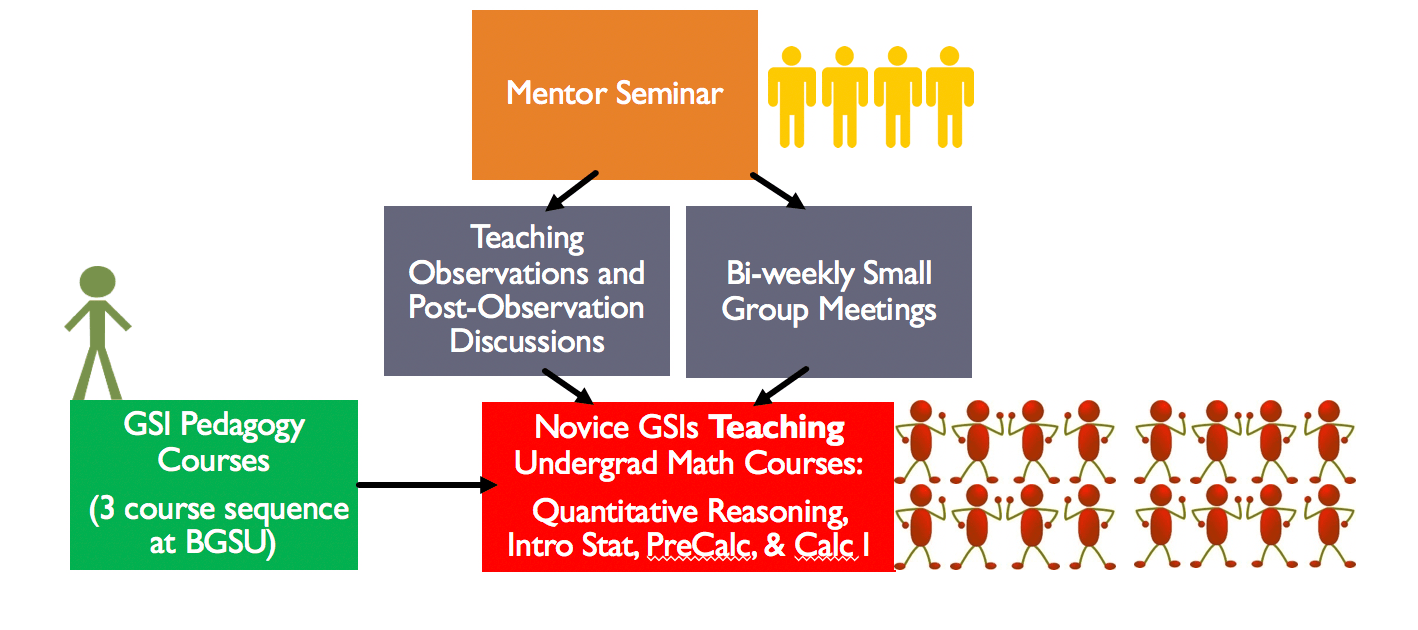Peer Mentoring Program
The peer-mentoring program equips and supports mathematics and statistics graduate students as they transition into their role as instructor of record for a number of undergraduate mathematics courses at BGSU. By conducting teaching observations, providing explicit feedback and facilitating small group meetings, peer-mentors and first-year (novice) Graduate Student Instructors (GSIs) develop a collaborative community of practice where they all become more effective, efficient, student-centered instructors.
Overview
During a mathematics and statistics GSIs’ development at BGSU, they may have opportunities to teach foundational mathematics courses ranging from College Algebra through Calculus. Their instructional decisions and development as a teacher are supported by course coordinators, three courses (MATH 5900, 5910, and 5920), and the peer-mentoring program. Initially funded by the National Science Foundation (NSF Awards #1544342 & #1725264), the peer-mentoring program provides two critical foundations for support: teaching observations and small-group discussions around teaching. Experienced graduate students are trained as peer mentors to facilitate productive and open discussions about the challenges encountered during teaching and provide post-observation feedback to novice GSIs. These levels of support have been beneficial to the BGSU mathematics and statistics department culture of graduate student teaching as well as undergraduate student learning [1-7].
The following logic model demonstrates the layers of support for GSIs at BGSU:

Parts of Peer-Mentoring Program
The following components are included in the peer-mentoring program:
- A semester-long professional development seminar where experienced graduate students learn how to facilitate small group meetings, conduct teaching observations, and provide critical, explicit feedback to novice instructors. Only graduate students who complete the professional development semester are able to apply to be considered for a peer-mentoring position in future academic years.
- The Graduate Student Instructor Observation Protocol (GSIOP, [1]) designed for GSIs teaching service mathematics and statistics courses emphasizing student engagement.
- Post-Observation Feedback Structure (Red-Yellow-Green Feedback, [4]) where mentors give supportive and explicit feedback on how to improve.
- Small group meeting topics of value to novice GSIs including, but not limited to: collaborative learning, student engagement, critical reflection, managing constructive criticism, formative and summative assessment, grading, classroom management, creating/modifying lesson plans, time management, specific content advice. [2, 3]
References
1. Rogers, K. C., Petrulis, R., Yee, S., & Deshler, J. (2019). Mathematics Graduate Student Instructor Observation Protocol (GSIOP): Development and Validation Study. International Journal of Research in Undergraduate Mathematics Education. https://doi.org/10.1007/s40753-019-00106-4. Accessible here.
2. Rogers, K.C., & Yee, S.P. (2018, February). Peer mentoring mathematics graduate student instructors: discussion topics and concerns. Proceedings from 21st Conference of the Research in Undergraduate Mathematics Education (RUME), San Diego, CA.
3. Rogers, K. C. & Yee, S.P. (2017a, November). Experienced and novice graduate students navigating mathematics instruction together. Proceedings from 39th Conference of the North American Chapter of the Psychology of Mathematics Education (PME-NA, p.539), Indianapolis, IN.
4. Yee, S.P., Deshler J., Rogers, K.C., Petrulis R., Potvin, C.D., Sweeney, J. (2019, February). Bridging the Gap: From Graduate Student Instructor Observation Protocol to Actionable Post-Observation Feedback. Proceedings from 22nd Conference of the Research in Undergraduate Mathematics Education (RUME), Oklahoma City, OK.
5. Yee, S.P. & Rogers, K. C. (2017b, March). Training graduate student instructors as peer mentors: how were mentors’ views of teaching and learning affected? In T. Olson & L. Venenciano (Eds.), Proceedings from 44th Annual Research Council on Mathematics Learning (RCML, pp. 33-44), Fort Worth, TX: Research Council on Mathematics Learning (RCML).
6. Yee, S.P. & Rogers, K. C. (2017c, February). Mentor professional development for mathematics graduate student instructors. Proceedings from 20th Conference of the Research in Undergraduate Mathematics Education (RUME, pp. 1026-1034), San Diego, CA.
7. Yee, S.P. & Rogers, K. C. (2016, February). Graduate students’ pedagogical changes using iterative lesson study. Proceedings from 19th Conference of the Research in Undergraduate Mathematics Education (RUME, pp. 1458-1466), Pittsburgh, PA.
Updated: 07/06/2020 02:38PM
